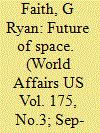| Srl | Item |
| 1 |
ID:
119996


|
|
|
|
|
| Publication |
2012.
|
| Summary/Abstract |
Nearly one hundred countries, including the world's spacefaring nations, have formally agreed upon the principles set out in the 1967 "Treaty on Principles Governing the Activities of States in the Exploration and Use of Outer Space, Including the Moon and Other Celestial Bodies," more commonly known as the UN Outer Space Treaty. This document represents our global consensus on the fate and disposition of the rest of our solar system, of our galaxy's one hundred billion other stars (and their solar systems), and of the one hundred billion additional galaxies in the universe; it was all decided before the first moon landing.
|
|
|
|
|
|
|
|
|
|
|
|
|
|
|
|
| 2 |
ID:
146759


|
|
|
| 3 |
ID:
119435


|
|
|
|
|
| Publication |
2013.
|
| Summary/Abstract |
Religion has seriously affected the gathering of intelligence since Biblical times. Beginning post-World War II with the rise of the state of Israel, however, religion began to become a direct political issue for the first time since the Middle Ages. The 1979 Iranian revolution brought this development to center stage, as practitioners of diplomacy were forced to study the interaction more carefully. The United States Intelligence Community (IC) understood some of this at the tactical level, but like the diplomatic community, has been slow to comprehend how fundamentally religion changes geostrategic considerations, hinders collection, impacts analysis, and changes the nature of covert operations, especially at the strategic level where politics, diplomacy, and intelligence intersect. To meet the challenge, the Intelligence Community and most statesmen need to develop much better understanding of religion's interplay with diplomacy among those at the upper levels who affect the direction of national policy.
|
|
|
|
|
|
|
|
|
|
|
|
|
|
|
|
| 4 |
ID:
141305


|
|
|
|
|
| Summary/Abstract |
JENNIFER L. ERICKSON analyses the U.S. decision to support the UN Arms Trade Treaty initiative in October 2009. She argues that this support was part of a broader policy shift toward multilateralism that the Obama administration made in an effort to repair the reputation of the United States within the diplomatic community.
|
|
|
|
|
|
|
|
|
|
|
|
|
|
|
|